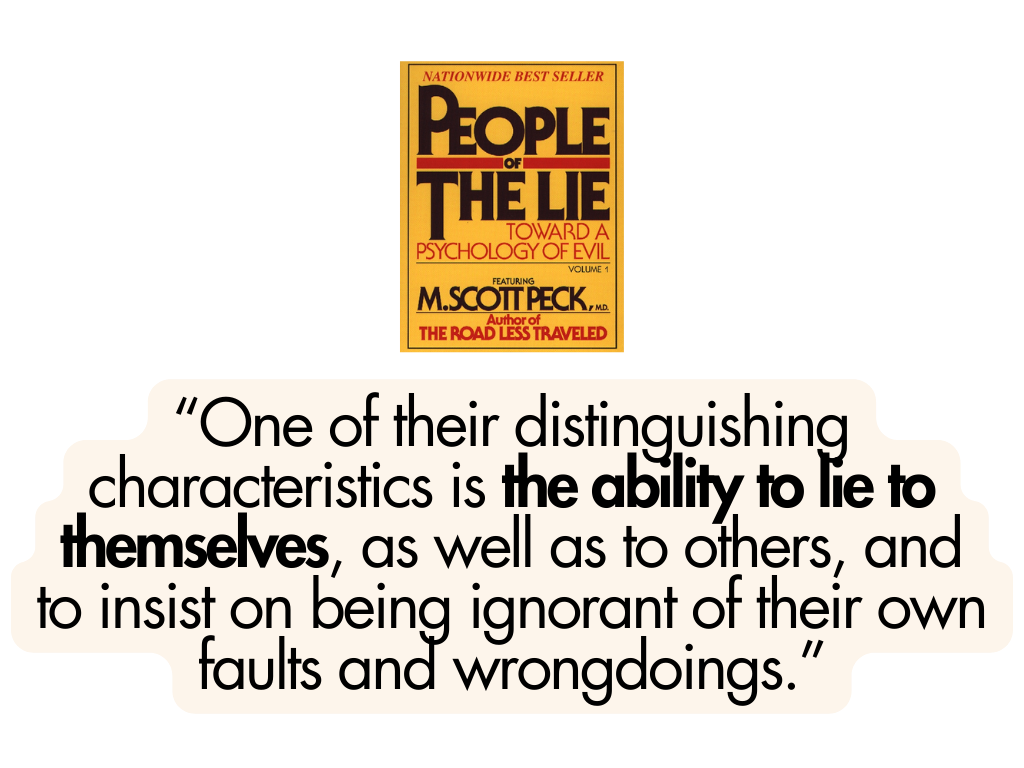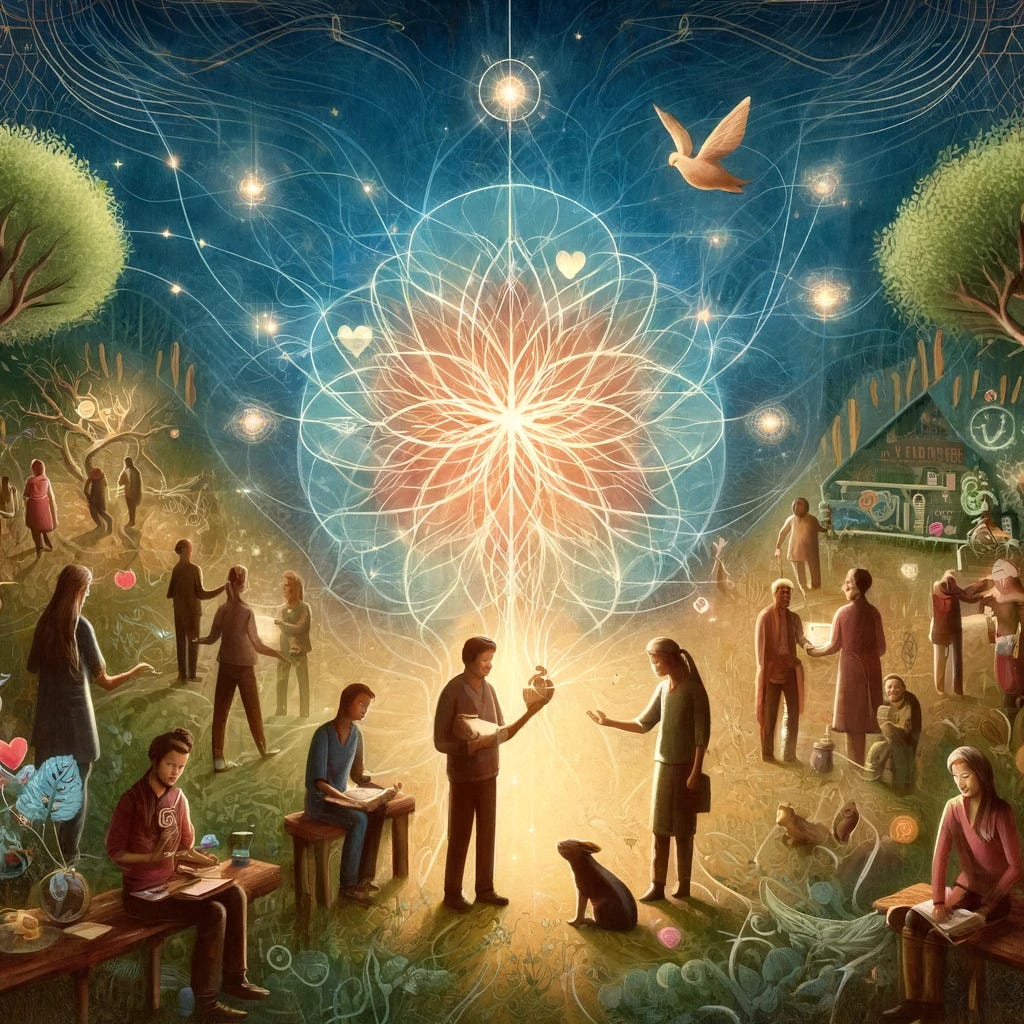Narcissism - The Main Cause of Evil in the World
Understanding why everyone is talking about Narcissism like our lives depend on it
Last week, I introduced the concept of “metacrisis” by examining the psychological drivers inherent in all humans, drawing from a profound discussion between Daniel Schmachtenberger, John Vervaeke and Iain McGilchrist in September last year. The piece delved into the broad and interconnected challenges facing our world, highlighting the urgency of understanding these crises through a collective lens (so we know that we aren’t alone in feeling this).
This week, we pivot to the individual, focusing on how these global dilemmas mirror the personal, inner turmoil many face, and exploring how individual transformation might reflect and contribute to addressing the wider metacrisis.
TL;DR: Learn to understand what constitutes a narcissistic trait. Follow global conversations on our society’s relationship with narcissism. Build your own resilience. Practice compassion — start healing yourself to heal others.

The concept of “narcissism” has been a bit of a passion topic of mine, especially when I first got to understand the ‘quirks’ (to put it lightly) of human behaviour that often pop up both in our work and personal lives — uncovering the ‘hidden layer’ (motivating factor) beneath the surface of office politics, leadership styles and relationship dynamics. But what really took me by surprise was the realisation of how much the narcissistic trait spills over into other areas of our lives, and how avoidant we all are at criticising the people we love.
The Premise
“Hurt people hurt people. But not all hurt people hurt people.”

I think most of you would be familiar with the first part of the quote. “Hurt people hurt people” encapsulates a cycle of trauma, saying that those who have experienced pain are more likely to inflict it on others. But to fully be aware of where our understanding with trauma is now, I’ve added the second part. The part that is most intriguing to me - “But not all hurt people hurt people”. Why is that?
Some individuals transcend their pain without passing it onto others. This divergence raises questions about the internal mechanisms that make some people more resilient, while others succumb to behaviours such as narcissism, functioning as part of their self-defense mechanism to mask their shame, rage, and denial.
So, it’s the internal transformation in response to trauma, rather than the trauma itself, that defines our path. Linking this to Gabor Maté, a Canadian physician and author of “The Myth of Normal”, and his insight into trauma;
“Trauma is not what happens to you, it is what happens inside you” — Gabor Maté
There’s A Lot of Hurt People

An American comedian, Bill Burr, delivered a truth-hitting joke about how he was forced to bottle up his emotions after surrendering his problematic dog due to his wife’s pregnancy. All the unresolved emotions go on the ‘Shelf of Anger’ that sits in every men’s chest, Bill continues, “and I couldn’t help but wonder in that moment, who that I love in my life is gonna pay for that in the future?”
I think the world needs to hear more of Bill Burr’s narrative on anger. To have his level of emotional self-awareness goes a long way towards breaking the trauma cycle. I want to share a short clip of him talking about cutting ties with narcissistic people, and the difficulty that comes with confronting a narcissist in life.
“Since narcissists deep down feel themselves to be faultless, it is inevitable that when they are in conflict with the world they will invariably perceive the conflict as the world’s fault. Since they must deny their own badness, they must perceive others as bad. They project their own evil onto the world. They never think of themselves as evil, on the other hand, they consequently see much evil in others.”
— M. Scott Peck, a psychiatrist and author of “People of the Lie” (1983), a book that explored the nature of evil through psychological lens. He described encounters with patients whose behaviours he considered manifestation of evil, characterised by extreme narcissism and a lack of empathy.

M. Scott Peck was a complex figure himself, but was widely recognised for his contributions to psychology exploring the nature of personal growth and relationships. Even though his personal life was marked by contradictions and self-admitted flaws (marital infidelities and personal struggles with his own parents and children), his analysis on ‘an evil’ person is remarkably on point with a lot of the conversations surrounding ‘narcissism’ happening around the world right now.
“Narcissism has not only become a normalised social condition, it is increasingly being incentivised.” — Dr. Ramani Durvasula at TEDxSedona in 2019
“Being raised by a narcissistic parent can lead to low self-worth, seeking out toxic relationships, and potentially adopting narcissistic traits. Children of narcissistic parents are often seen as an extension of their parent's image, making them vulnerable to criticism and rejection if they do not meet expectations.” — Dr. Seth Meyes discusses signs that someone was raised by a narcissist in 2020
“Covert narcissists use self-deprecation to manipulate others into complimenting them and reinforcing their ego. They also have a different public image compared to who they truly are, leading to confusion and isolation for those close to them. They are hyper jealous and envious, often putting down others who have achieved more than them.” — Barbara Heffernan talks about the mind of a covert narcissist in 2023.
“Narcissists do care about other people, but only in relation to themselves and their own needs.” — Dr. Paul Conti clarifies that while narcissistic individuals may have the ability to understand and manipulate others, this does not necessarily mean that they care about them.
“Increasingly they came to occupy roles in corporate boardrooms, in the judiciary, and now in among politicians and even the presidency” — Dr. Bandy Lee, a psychiatrist who authored the book, “The Dangerous Case of Donald Trump” talked about a tragic societal consequence of prolonged exposure to a leader with a severely impaired psychology.
M. Scott Peck’s Definition of an “Evil Person”
Stumbling upon M. Scott Peck’s definition was a revelation that excited me beyond words. Narcissism, like other personal traits like agreeableness, operates on a spectrum, with each individual displaying some level of narcissistic behaviour. While a degree of narcissism can be found in everyone, signifying a healthy self-esteem and ambition, it crosses into the realm of disorder when these traits are excessively amplified. High levels of narcissism can disrupt personal relationships and overall well-being, marking the shift from a common personality trait to a concerning personality disorder. Below is one of the most accurate description of a narcissistic person I’ve found so far;
is consistently self-deceiving, with the intent of avoiding guilt and maintaining a self-image of perfection
deceives others as a consequence of their own self-deception
projects his or her evils and sins onto very specific targets (scapegoats) while being apparently normal with everyone else (selective insensitivity)
commonly hates with the pretense of love, for the purpose of self-deception as much as deception of others
abuses political (emotional) power to impose their will, using both direct and subtle means
maintains a high level of respectability, and lies incessantly to do so
exhibits a pattern of destructive behaviour towards relationships, defined more by persistence than the severity of actions
is unable to think from the viewpoint of their victim (scapegoating)
demonstrates a hidden inability to accept criticism or any slight to their ego
What We Understand About Narcissism So Far
Recent years have seen a surge in the scientific exploration of narcissism, thanks in part to the work of professionals like Dr. Ramani Durvasula (Watch: Dr. Ramani’s interview with Mel Robbins outlining her take that narcissism is not a diagnosis but a personality style that is maladaptive) and Dr. Paul Conti (Watch: Paul’s interview with Lex Fridman defining narcissism as a pervasive sense of self-inadequacy, accompanied by fear, vulnerability, and a defensive mechanism dominated by envy) that have contributed to increasing the public awareness of narcissistic tendencies within ourselves and others.

Two Thousand Years of Narcissism
Exploring the concept of narcissism through a historical lens gives us insights into how perception of self and ego have evolved over time. It also demonstrates humanity’s ongoing efforts to understand the complexity and multifaceted nature of human traits and behaviours that impact people and society at large.
Ancient Era — Mythology (8 AD)
The term narcissism derived from a Greek mythology character called, Narcissus from a Roman poem about a handsome young man who falls in love with his own reflection in a pool of water. Despite his beauty, Narcissus rejected every romantic advance made towards him, and spurned the love of the nymph Echo. A goddess punishes Narcissus by cursing him to fall madly in love with the unobtainable — his own reflection in the pool. This myth ultimately covers two notable themes of narcissism — inordinate self-love coupled with disdain and callousness toward others.
Late 19th Century (1898)
Havelock Ellis, an English-French physician and psychologist, first identified narcissism as a mental disorder focusing on pathological self-absorption. His work laid the groundwork for understanding narcissism as characterised by an inflated self-image, addiction to fantasy, a notable coolness and composure that’s only disturbed when narcissistic confidence is threatened, and a tendency to exploit or take others for granted.
Early 20th Century (1914)
Sigmund Freud’s work in the early 1900s expanded the concept, suggesting narcissism is a normal stage in child development, but it becomes problematic when it persists into adulthood. Freud differentiated between primary and secondary narcissism, with primary narcissism as a necessary phase of self-love in early development, and secondary narcissism as a regression (‘self-defence mechanism’) from a more mature stage of having the capacity to love others, redirecting that love back onto oneself. This concept underlines the importance of balancing self-love with the love of and for others, a balance critical for emotional and social well-being.
Mid-20th Century (1920s — 1960s)
The work of an analyst like Karl Abraham contributed to the understanding of narcissism in relation to the self and interpersonal relationships — linking low self-esteem to narcissistic behaviours. Freud’s contemporaries and successors, such as Wilhelm Reich and Heinz Hartmann, furthered explored the concept, linking it to ego psychology and character armour.
Late-20th Century (1970s — 1990s)
This period saw a significant advancements in the understanding of Narcissistic Personality Disorder (NPD) through the work of Heinz Kohut, Otto Kernberg, and James F. Masterson. Kohut introduced the concept of narcissistic transferences and the importance of providing “empathetic responses” in treatment.
Present Day (2024)
After the 1990s, the development and knowledge of narcissism expanded significantly, addressing various facets from its genetic components to the influence of social media and parenting styles — especially the so-called “self-esteem movement” characterised by excessive praise without substance, has been criticised for fostering a sense of entitlement and insecurity rather than genuine self-esteem. Such findings underscore the complexity of narcissism’s origins, pointing to the interconnectedness between societal changes, parenting practices, and individual predispositions.
So, what can we do?
It seems fitting to conclude my piece with a reflective story about Erich Fromm, a renowned German social psychologist, who became famous for his theories about the interplay between psychology and society.
His work blends the elements of Freudian psychoanalysis with Marxist theory, along with insights from Zen Buddhism and humanistic principles, to explore the nature of freedom, love and human potential. His ideas were influential in the development of critical theory, and the study of personality and culture.
"The longer we continue to make the wrong decisions, the more our heart hardens; the more often we make the right decision, the more our heart softens—or better perhaps, comes alive. Each step in life which increases my self-confidence, my integrity, my courage, my conviction, also increases my capacity to love and to feel loved. The man who is predominantly concerned with being cautious, with protecting himself, cannot love; the man who is free of anxieties and fears, who is open to life, can love and be loved."
— Erich Fromm, “The Sane Society” (1955)
Fromm critiqued modern capitalist societies, which he believed led individuals to feel isolated and alienated. He argued that this system encourages materialism and conformity, stifling individual creativity and freedom.
The quote reflects his belief in the importance of making conscious, ethical decisions to nurture our capacity for love and genuine connection. He suggested that our choices shape not just our circumstances, but out very being — our ability to empathise, to love, and to be truly alive.
By continually making decisions that align with our deepest values and the welfare of others, we cultivate a more vibrant, compassionate heart. Conversely, consistently making choices that betray our values or harm others leads to emotional and spiritual hardening, diminishing our capacity for connection and growth.
TL;DR: Learn to understand what constitutes a narcissistic trait. Follow global conversations on our society’s relationship with narcissism. Build your own resilience. Practice compassion — start healing yourself to heal others.
View the conversation on Reddit.
11/04/2024 update:
Philosophize This! podcast has done a great episode on “Achievement Society and the rise of narcissism, depression and anxiety” — I would highly recommend Stephen West for those interested to explore more on the philosophical aspect. In this episode, he introduced Byung-chul Han, a South Korean born, German philosopher who argues that modern neoliberal societies lead individuals to narcissism — a phenomenon not just a result of individual choices but driven by the societal ethos that values self-obsession and personal achievement as the primary modes of living.






















Thanks for dropping by Severin! So wonderful you mentioned McGilchrist’s Hemisphere theory. I covered that in my last piece when he had that metacrisis conversation with Daniel Schmachtenberger and John Vervaeke.
I like how you’ve put it - “struggle immensely with breaking out of their model of the world” - absolutely yes. That’s essentially the metacrisis situation we’re talking about. Highly narcissistic individuals are not the only one suffering (although silently and conflictingly) - the people surrounding them are also affected.
Yes, the title. I did sit on it for days until I made peace with my own position on it. This time, I’m fully aware of using a reductionist view on narcissism as a way to put focus on this critical part of us that is often not talked about enough. Iain mentioned in his talk once that there seems to be a growing sentiment of those who think “if I can get away, I will” and that’s the evil part inside of us that I’m talking about. Highly narcissistic people do act out on these “bully” tendencies because they’ve been getting awe with it their whole life.
I think partly myself, I come from a place where “narcissistic behaviours” are normalised. Normalised because it’s done by those who hold high social status within their community. Thai culture is a fear-based society. Critical thinking outside the norm is extremely frowned upon so just wanted to make a clear stance where the root of evil stems from. Power and money can corrupt anyone and with this being democratised in modern society like it is now, it’s the perfect breeding ground for narcissism if we’re not careful and conscious enough with ourselves and others alike.
I love this part, "By continually making decisions that align with our deepest values and the welfare of others, we cultivate a more vibrant, compassionate heart. Conversely, consistently making choices that betray our values or harm others leads to emotional and spiritual hardening, diminishing our capacity for connection and growth."